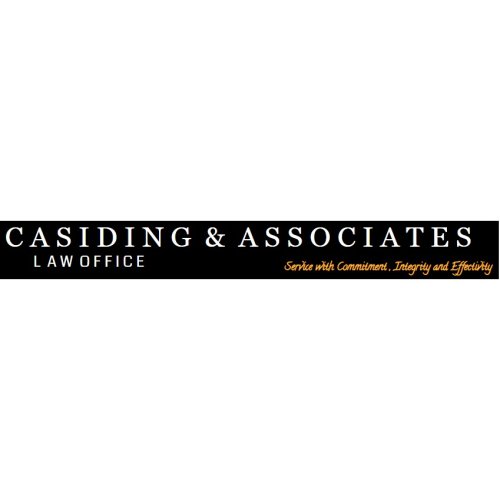Best Employer Lawyers in Philippines
Share your needs with us, get contacted by law firms.
Free. Takes 2 min.
Or refine your search by selecting a city:
List of the best lawyers in Philippines

Dagsaan Monterde Castillo Law and Notary Public (DMC LAW)
15 minutes Free ConsultationAbout Employer Law in Philippines
Employer law in the Philippines encompasses a wide range of legal matters that govern the relationship between employers and employees. It is primarily guided by the Philippines Labor Code which outlines the rights and responsibilities of both parties. The Labor Code aims to promote fair employment practices and protect the workforce. Employer law covers hiring, wages, working hours, benefits, termination, workplace safety, and dispute resolution. It also emphasizes the protection of workers' rights while balancing legitimate interests of employers in the business environment.
Why You May Need a Lawyer
Individuals or businesses may seek legal assistance in the field of employer law for various reasons. Common situations include:
- Dispute Resolution: Employers may face disputes regarding compensation, wrongful termination, or unfair labor practices.
- Compliance Issues: Helping businesses navigate complex labor laws to ensure compliance and avoid potential infractions.
- Contract Review: Drafting, reviewing, or negotiating employment contracts to protect both employer and employee interests.
- Representation in Labor Proceedings: Legal representation during mediation or in labor courts is often crucial.
- Workplace Policy Development: Expertise in crafting legally compliant policies, such as anti-discrimination and harassment prevention policies.
Local Laws Overview
The key aspects of local laws relevant to employers in the Philippines involve compliance with the Labor Code and various special laws such as the Anti-Sexual Harassment Act and the Magna Carta for Women. Employers must ensure:
- Proper compensation and wages as per the minimum wage law.
- Lawful implementation of working hours, overtime, and rest days.
- Adherence to lawful procedures for employee discipline and dismissal.
- Provision of mandated benefits, including 13th-month pay, leave entitlements, and health benefits.
- Protection of employees' rights to organize and participate in collective bargaining.
- Implementation of workplace safety and health standards.
Frequently Asked Questions
What is the minimum wage in the Philippines?
The minimum wage in the Philippines varies by region and is set by the Regional Tripartite Wages and Productivity Boards. Employers must stay informed about updates specific to their region.
How does the 13th-month pay work?
The 13th-month pay is a mandatory benefit that all employees should receive by December 24th each year, equivalent to one-twelfth of their basic annual salary.
What are the grounds for lawful termination?
Employers can terminate employees for just causes such as serious misconduct, willful disobedience, and habitual neglect of duty, following due process.
Are non-competition clauses enforceable?
Non-competition clauses are generally unenforceable in the Philippines unless they are reasonably limited in time, space, and are necessary to protect the legitimate business interests of the employer.
What should I do if facing an unfair labor practice claim?
It is crucial to consult with a legal expert to assess the claim, gather evidence, and prepare a defense strategy.
How can an employer ensure compliance with labor laws?
Employers should regularly review and update company policies, maintain proper documentation, and conduct training to ensure compliance with labor laws.
What rights do employees have regarding work hours?
Employees are entitled to rest breaks, premium pay for overtime work, and specific workhour limitations as stipulated in the Labor Code.
What is the role of unions in the workplace?
Unions are organizations that represent workers in negotiations with employers regarding wages, working conditions, and other employment terms.
How do end of contract practices work?
End-of-contract practices, or "Endo," refer to fixed-term employment contracts. While legal if compliant with regulations, practices exploitatively bypassing benefits have faced crackdowns.
Is an employer liable for workplace accidents?
Employers have responsibilities under occupational safety and health laws and can be liable if negligence in maintaining a safe workplace is proven.
Additional Resources
Individuals and businesses seeking more information can refer to resources such as:
- Department of Labor and Employment (DOLE)
- National Labor Relations Commission (NLRC)
- Philippine Chamber of Commerce and Industry (PCCI)
- Trade unions and workers’ organizations
- Legal services and law firms specializing in labor and employment law
Next Steps
If you require legal assistance within employer law, consider the following steps:
- Identify specific legal issues and relevant parties involved.
- Consult with a qualified attorney specializing in labor law for personalized advice.
- Gather necessary documentation and evidence related to your case or compliance needs.
- Engage in early dispute resolution methods to potentially avoid litigation.
- Stay informed about updates in labor laws and policies for proactive compliance.
Lawzana helps you find the best lawyers and law firms in Philippines through a curated and pre-screened list of qualified legal professionals. Our platform offers rankings and detailed profiles of attorneys and law firms, allowing you to compare based on practice areas, including Employer, experience, and client feedback.
Each profile includes a description of the firm's areas of practice, client reviews, team members and partners, year of establishment, spoken languages, office locations, contact information, social media presence, and any published articles or resources. Most firms on our platform speak English and are experienced in both local and international legal matters.
Get a quote from top-rated law firms in Philippines — quickly, securely, and without unnecessary hassle.
Disclaimer:
The information provided on this page is for general informational purposes only and does not constitute legal advice. While we strive to ensure the accuracy and relevance of the content, legal information may change over time, and interpretations of the law can vary. You should always consult with a qualified legal professional for advice specific to your situation.
We disclaim all liability for actions taken or not taken based on the content of this page. If you believe any information is incorrect or outdated, please contact us, and we will review and update it where appropriate.
Browse employer law firms by city in Philippines
Refine your search by selecting a city.
















